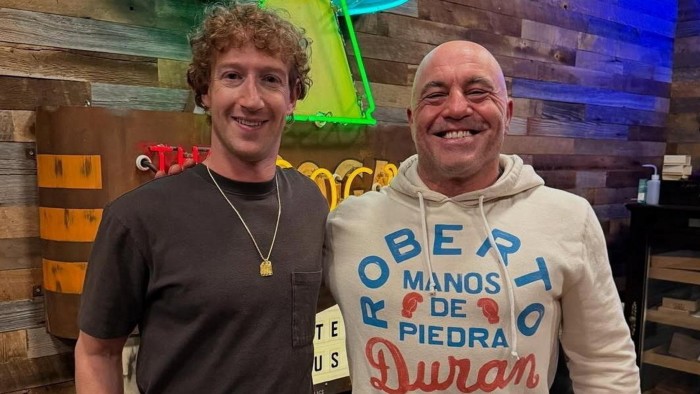Stay informed with free updates
Simply sign up to the Life & Arts myFT Digest — delivered directly to your inbox.
Mark Zuckerberg wants to unleash more testosterone in the workplace. Speaking on The Joe Rogan Experience last week, the Meta chief executive set out his vision. “A lot of the corporate world” has become “pretty culturally neutered”, he said during a near three-hour interview with the podcaster. “Society has plenty of that, but I think . . . having a culture that celebrates the aggression a bit more has its own merits that are really positive.”
Hell yeah! Following his Lizard Person and “Wife Guy” guises, the protean Zuckerberg has now entered his Jordan Belfort era, albeit one that involves wearing a grown-out “fro” and a gold medallion (inscribed with the Jewish prayer Mi Sheberach that he sings to his daughters every evening when he tucks them into bed). Gone is the pasty complexion of the replicant last seen testifying at the Senate; the Zuck skin is bronzed, the bod is buffed from his current obsession with martial arts. It was the study of Brazilian jiu-jitsu that apparently helped inform his chauvinistic epiphany: he told Rogan that hanging out with his male friends while they “beat each other” had enabled him to redefine his relationship with masculinity. Hmm.
These latest pronouncements follow the bigger news that Meta will no longer be using fact-checkers, all part of a rather craven effort to win favour with the incoming Republican regime. It’s a far cry from the snivelling penitent who was last year apologising to those parents who had lost children to sexual exploitation or harassment via his social media platforms. Likewise, his desire to reintroduce aggression to the workplace seems somewhat out of character for an individual who spent the better part of last year preparing a version of “Get Low”, the “lyrical masterpiece” by T-Pain, to serenade his wife Priscilla Chan, or skipping around the garden under a massive turquoise statue of her likeness.
What precisely is this “masculine energy” of which he speaks, and how can we apply it? Naturally I turn to my colleagues to ask for advice and present their thoughts entirely without credit on the basis that the first rule of ME is surely to exploit the brilliance of those around you and then pass off all of their ideas and innovations as your own.
1. Team-building trip to Hawaii to hunt invasive pigs
2. Slack group rating the attractiveness of female employees
3. Lads’ mag lending library and a dartboard on every floor
4. Forcing everyone to sponsor your fifth Marathon des Sables
5. Leaving meetings after five minutes or dropping off a call because you’ve absorbed enough already/ “cannot add further value”
6. Protein only for lunch
7. Installing a wall of massive TVs that play a constant stream of live sports matches, no matter the hour, no matter the obscurity of the sport.
8. Replacing the water taps with Madrí
Negotiating the specifics of masculinity in this era of millennial sensitivity however is not so straightforward. The idea that the tender young swains who inhabit my creative field might have a yen to unleash their inner wolves seems almost laughable to me. While one co-worker offers helpfully to “start spraying Lynx Africa under the desks” if we feel the need to disrupt the carefully ungendered environment we have been fostering, most expressions of male masculinity, in our department anyway, involve regularly embracing and the provision of home-baked goods.
I often observe male colleagues hugging while wandering the newsrooms of the Financial Times offices, and not just in the “hearts and flowers” departments that will henceforward describe Weekend features, but even within the high-tension, high-stakes worlds of Companies and Markets, too. As another colleague points out: Zuckerberg may have a point that we’ve all gone a bit soft, but he is confusing gender politics with generational attitudes, and perhaps he is simply advocating for Gen-X energy and a return to the dirty old days of office life.
Certainly, I remember working in a newsroom in the late 1990s when masculine energy swole unfettered all around us. And I do rather miss the drama of watching senior management get into fistfights and stand-offs over tiny misunderstandings, and men and women behaving badly as they were wont to do those days. I miss that louche, less nannied attitude that allowed people more latitude with their projects, plus the freedom from the Slack tyranny that keeps one chained to one’s computer every hour of the day. But I don’t miss the gropey leering, nor the patronising twaddle, nor the men’s club meetings into which one might be invited if one’s skirt was grazing sufficiently highly on the thigh.
The suggestion, however, that the workplace has become any less competitive for the addition of a few hugs and home-baked pastries is a nonsense. In a market where employment levels are so stagnant, young graduates and interns must conceal their killer instincts while constantly negotiating how to advance their professional lives. Everyone knows the most successful young careerists these days are not the aggressive wilder men of history, but the ones who bring the biscuits, make the deadlines, put in the extra effort and steer new projects. Zuckerberg’s wrong: we’re more in need of that most feminine of energies in the workplace, the ability to multitask.
Email Jo at [email protected]
Find out about our latest stories first — follow FT Weekend on Instagram and X, and subscribe to our podcast Life and Art wherever you listen
Read the full article here

